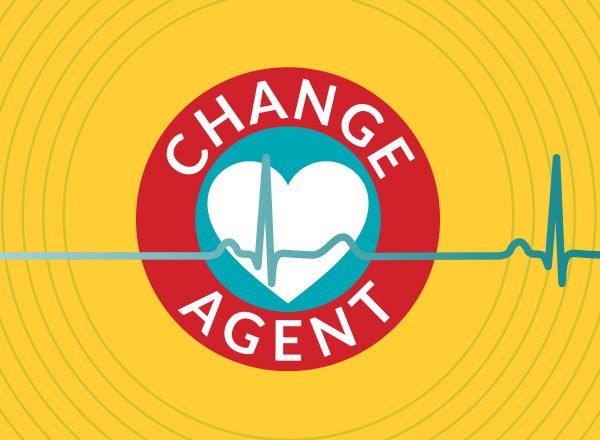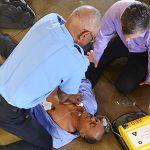The National League for Nursing (NLN), Laerdal Medical, the American Heart Association, and RQI Partners recently welcomed 12 groundbreaking, game-changing higher education institutions as inaugural Change Agents adopting the Resuscitation Quality Improvement® (RQI®) program.
Continuing our recognition of National Nurses Week, we are excited to share reflections from our leaders on the promise of this partnership as well as perspectives from university faculty on the far-reaching impact of the RQI program.
Fulfilling Our Shared Mission
As early adopters of the innovative RQI program in higher education institutions, these schools will help elevate high-quality CPR skills and prepare future nursing professionals to respond to cardiac arrest events competently and confidently — leading to improvement in survival rates.
“We are celebrating a new era in healthcare education where our remarkable past and exceptional present intersect to position us for a shared transformative future,” said NLN President and CEO Beverly Malone, PhD, RN, FAAN.
She added, “Together we will help perfect and deliver a first-ever, highly reliable progressive quality program tailored to the more than 150,000 students who graduate annually from nursing and allied health education programs at U.S. colleges and universities. This is the next pivotal phase in fulfilling our shared mission to further the health of this nation and the global community, achieve excellence in nursing education, and, most importantly, help save more lives.”
Bringing RQI to Nurses of Tomorrow
Laerdal Medical CEO Alf-Christian Dybdahl explained the lifesaving impact of the RQI program to date and its anticipated reach moving forward: “Since introducing RQI in 2015 in collaboration with the American Heart Association, more than 2,400 hospitals and 2 million nurses have adopted and enrolled in the program. More significantly, we estimate that 20,000 lives have been saved.”
He continued, “Now we bring RQI to our nurses of tomorrow, helping the NLN uphold its commitment to members to offer innovative products and dynamic experiences tailored to the unique needs of learners, faculty, and administrators and heighten the potential to save even more lives.”
John Meiners, Chief of Mission-Aligned Businesses and Healthcare Solutions at the American Heart Association, issued a warm welcome: “To each of the Change Agent schools, welcome to the RQI Community and thank you for your efforts to influence change in healthcare.”
A Collective Purpose, Passion, and Power
RQI Partners CEO Brian Eigel, PhD shared how the new partnership will advance the crucial reach of the RQI program. “We're excited to closely collaborate with the 12 member schools to unleash and elevate RQI’s potential in higher education.”
He added, “Accelerating and influencing program adoption positions us to ensure healthcare professionals with verified high-quality CPR competence are thriving in every community. Then and only then can we impact and improve survival from cardiac arrest. I look forward to harnessing our collective purpose, passion, and power to further excellence in nursing education by offering students this new unique pathway to verified CPR competence.”
Introducing the 12 Change Agent Universities:
1. Anderson University – Anderson, Indiana
2. Michigan State University – East Lansing, Michigan
3. North Carolina Central University – Durham, North Carolina
4. Purdue University Northwest – Hammond and Westville, Indiana
5. Rutgers University – Camden, New Jersey
6. University of Alabama, Huntsville – Huntsville, Alabama
7. University of Cincinnati – Cincinnati, Ohio
8. University of Delaware – Newark, Delaware
9. University of Massachusetts, Boston – Boston, Massachusetts
10. Ursuline College – Pepper Pike, Ohio
11. Wichita State University Campus of Applied Sciences and Technology (WSU Tech) – Wichita, Kansas
12. Western Governors University – Salt Lake City, Utah
“Shifting to a competency framework, RQI fits right in. The system builds competence as well as confidence in the student that they are ready for those life and death moments they will encounter in practice. The value of RQI is seen by our students. We have students that already have their BLS [eCard], but when they heard about RQI, they signed up citing they needed to practice. They understand the value, and that excites us, it lets us know we are doing the right thing.”
Kimberly Dillon-Bleich, PhD, RN, CNE, Associate Dean for Undergraduate Nursing Programs and Assistant Professor, Breen School of Nursing and Health Professions at Ursuline College
Embarking on a New Journey
As we embark on this new journey with the NLN, we are honored to now support the entire spectrum of nursing from student education to established professionals with verified competence and confidence in providing high-quality resuscitation care.
To learn more about RQI for nursing education, visit CPRNursingEd.org.








